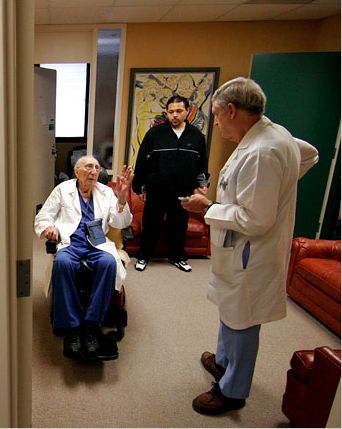A compelling clinical vignette always gets me. Those written for lay eyes grip me even more. The exceptional writer strips away the medical nuance and expresses the case in the starkest of terms. The stakes feel germane, the emotions conveyed hit close to home.
We have been there we say and ask if a similar patient might occupy our bed tomorrow. Alternatively and as applicable, we imagine if the profiled provider could be us.
We also engage these accounts for comfort and solidarity. We take solace in sharing similar front line experiences with others, as atypical as they sometimes might be.
Apiece with that spirit, I recently read an illuminating article in The Atlantic.
The account profiles a physician and the difficult dilemma he faced caring for an acutely ill man with a tenuous, but hopeful prognosis. He had no advanced directives and the family, going against convention, wished to cease all life sustaining measures:
But, the family seemed unconvinced. They kept on asking questions like what will Brown do without the limbs? What would his future be like?
“They were adamant, not angrily so,” said Williams, who was still finding it hard to believe that the family wanted to let Brown go. Brown’s family was not angry or overly emotional. They were unequivocal about what they wanted. They wanted him to have the breathing machine stopped. They were sure Brown wanted it.
Brown had left no advanced directive — no written account of his wishes for medical care in near-death situations. Nobody had ever heard Brown talk about anything concerning end-of-life situations. Their certainty about his wishes amounted to speculation, however confident.
We adhere to our morals and the ethics of medicine. How do you walk away from life?
I won’t spoil the account (you have to read yourself), but the storyline plays to a familiar theme: our country’s inability to cope with or prepare for critical illness and death? Also but no less important, how do caregivers respond to atypical surrogate wishes.
This leads me to another story I recalled while writing.
We all know the celebrated surgeon Michael E. DeBakey (if you do not, cash in your medical license now). He underwent a AAA repair at age 98. The NY Times profiled the case several years ago:
He refused to be admitted to a hospital until late January. As his health deteriorated and he became unresponsive in the hospital in early February, his surgical partner of 40 years, Dr. George P. Noon, decided an operation was the only way to save his life. But the hospital’s anesthesiologists refused to put Dr. DeBakey to sleep because such an operation had never been performed on someone his age and in his condition. Also, they said Dr. DeBakey had signed a directive that forbade surgery.
As the hospital’s ethics committee debated in a late-night emergency meeting on the 12th floor of Methodist Hospital, Dr. DeBakey’s wife, Katrin, barged in to demand that the operation begin immediately.
Not an enviable situation for a physician, and if you have cared for enough folks, you probably have had a similar case with the inevitable punching up of phone numbers not normally accessed on your speed dial. You know them — ethics, risk management, and the patient representative.
Cutting to the chase, the case then goes to the operating room:
As he recovered and Dr. DeBakey learned what had happened, he told his doctors he was happy they had operated on him. The doctors say they were relieved because they had feared he regretted their decision.
“If they hadn’t done it, I’d be dead,” he said.
The doctors and family had rolled the dice and won.
The patients share similar themes. The common motif–caregiver and family dissent-–sit front and center. However, the contrast, when one surrogate chooses death and the other life, overrides many of the parallels. The tension made them compelling bookends and drew me to the keyboard.
You realize that even with the indecision of how our country will manage end of life care and the calls for greater engagement from our citizenry, no piece of paper will resolve certain impasses.
I will offer the following:
Advance directives simply promise more control over future care than is possible. We also cannot predict our preferences as our health states evolve and possibly worsen.
No planning can prevent a Mr. Brown or Dr. DeBakey from presenting to your hospital. We can only write about their (and our) plights to provide comfort for the times we look in the mirror for solutions. When the rulebook has no remedy and the right path seems more like the roll of a dice than an ordered prescription, we hope for the best and absorb whatever lessons these unfamiliar cases can teach us.




Leave A Comment